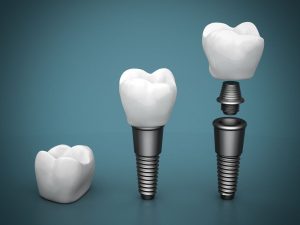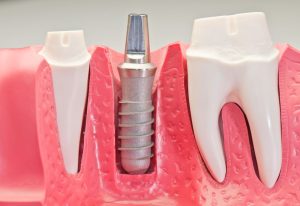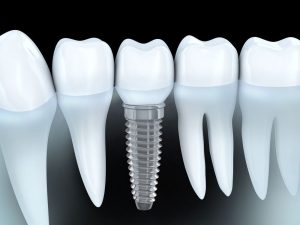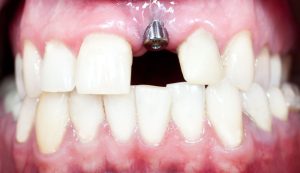Nowadays people are becoming more conscious of the materials they put into their bodies and how those elements may impact their overall health. Most prefer the least intrusive materials available when it comes to dental implants. It’s also important to know the implant’s quality, composition, and design features.
The tendency in recent years has been to avoid using metals in our bodies. Zirconia is a material that may be used instead of titanium for dental implants. Patients who are concerned about their health may ask, “Are zirconia dental implants better than titanium?”
Zirconia is a relatively new implant material, so let’s have a look at each and assess the pros and cons.
In this article, we’ll cover the following:
- The advantages and disadvantages of zirconia implants
- The advantages and disadvantages of titanium implants
- Zirconia vs. titanium implants: Which ones are better?
- Are zirconia dental implants better than titanium?
We hope that this information will help you decide which dental implants are best for you.
Zirconia vs titanium implants
In this article, we’ll look at the differences between zirconia and titanium implants, as well as the advantages and disadvantages of each.
Titanium implants

Titanium has been used for dental implants in Europe since the 1960s.
Titanium implants have been carefully explored since and remain the most common kind of dental implant because of their longevity, efficacy, and ease of care.
Advantages of titanium implants
- Durability: Titanium implants are made of a high-strength alloy that is resistant to breakage. It can resist the repeated strain of chewing even the hardest meals and items that regular dentures can’t handle.
- Long-term success: Although titanium dental implants have been present since 1965, their popularity soared in the 1970s. As a result, experts have had over 50 years to study their long-term success rate.
- Biocompatibility: Biocompatibility refers to a material’s ability to function well in the human body. In a process called osseointegration, it may even bond with the surrounding bone tissue. As a result, it can offer the strongest possible foundation for the prosthetic teeth that sit on top of it.
Titanium is also hypoallergenic. That means it’s a safe substance to use, even for most people who are allergic to metals or have metal sensitivities.
Disadvantages of titanium implants
There are also some drawbacks to using titanium in dental implants.
- Possible allergic reactions: Titanium is a substance that is hypoallergenic. Titanium implants, on the other hand, are made up of just 90 to 99 percent titanium, with a few additional metals mixed in. As a result, the use of a titanium implant might fail due to an allergic reaction to the metal components.
Manufacturers utilize numerous titanium alloys in their implants. Zinc, chromium, tungsten, nickel, tin, and vanadium are some of the other metals found in titanium dental implants. The ions produced by titanium dental implants may induce inflammation and irritation of the gums in patients with autoimmune diseases.
Individuals who have a history of metallurgic allergies should choose zirconia implants vs titanium dental implants.
- Unappealing appearance: Another difficulty with titanium implants is that the black metal might be seen through thin gums. Patients may find this unappealing in terms of appearance. When compared to titanium implants, zirconia implants have fewer cosmetic concerns.
Titanium implants pros and cons
|
|
Zirconia implants
Traditional titanium dental implants are more often replaced by zirconia implants, which are nonmetal alternatives. Zirconia is a ceramic-like substance with a natural white-colored tint.

When compared to titanium, zirconia has shown improved soft-tissue response and more attractive aesthetics.
Although zirconia implants offer several advantages, people have concerns when determining which material is best for them.
Advantages of zirconia implants
- The aesthetics of the material: The aesthetics of zirconia are a significant benefit. Zirconia is a great option for those who don’t want metal in their mouth or the risk of dark colors showing through the gums. Zirconia is more natural-looking than titanium because it has a tooth-like hue that fits in with the rest of the teeth.
- Higher corrosion resistance and less plaque: Zirconia implants, in addition to being corrosion-resistant, develop less plaque than titanium implants. Zirconia dental implants are also associated with fewer infections.
- Hypoallergenic: Many patients are concerned about metal allergies. Metal-free zirconia implants are far less likely than titanium implants to cause adverse reactions. As a result, they are less dangerous for those who are allergic to metals. Patients who are allergic to nickel or who don’t want to have metal implants may be better off with zirconia implants.
Watch this video to learn more about the advantages of zirconia dental implants:
Disadvantages of zirconia implants
- Fewer options: While zirconia implants have advanced significantly in the previous 15 years, they still offer fewer alternatives and are less adaptable than titanium implants. Titanium implants often have a wider range of components, including size, function, and solutions for complex treatments.
- Not as practical: One major criticism of zirconia implants is that they aren’t as feasible for sophisticated oral treatment as titanium implants.
- Less durable: Zirconia is more brittle and has a lower fracture strength than titanium. Under stresses that cause bending or flexing, zirconia is more susceptible to shatter. Zirconia has a greater risk of fractures and problems in the long run.
Zirconia implants pros and cons
|
|
Are zirconia implants better than titanium implants?

It all depends on your priorities. Titanium has a longer track record and decades of proof of its reliability. Zirconia implants offer better aesthetics and tooth-like color implants.
Zirconia is gaining some traction as a viable alternative to traditional titanium-based implant systems. When zirconia implants are compared to titanium implants, they are said to be better for soft tissues, biocompatibility, and aesthetics.
Furthermore, investigations have shown that titanium and zirconia implants have extremely comparable bone-to-implant contact, also known as osseointegration. This is a very important part of implant success because it affects how stable the implant is in the mouth and how well it works.
Zirconia vs titanium implants: How to choose the best option
Titanium implants are still the standard method for tooth replacement and have been improved with new innovations throughout time. Titanium implants have a success rate of 90% or higher. There hasn’t been enough time to do a lot of research to find out how well zirconia implants work in the long term.
Zirconia offers numerous benefits, but that doesn’t mean it’s perfect. When comparing titanium vs zirconia implants, you’ll find that zirconia has several drawbacks.
Despite the fact that zirconia implants are a safe and viable alternative to titanium implants, and that they are more aesthetically appealing, there are a number of reasons why people keep having titanium implants done.
This video explains more about the differences between zirconia and titanium implants:
Reasons for choosing zirconia implants
- Because zirconia’s smooth ceramic surface is resistant to plaque, it may be a more hygienic option than titanium implants.
- For example, if you need to replace a front tooth, a zirconia dental implant may always be the preferred option because of zirconia’s natural white tint.
Many individuals have naturally thinner gum tissue at the front, which allows the titanium alloy implant’s metal color to show through: not ideal for repairing a front tooth. Zirconia solves these issues, resulting in a high-quality result.

Reasons for choosing titanium implants
- Titanium has a long proven track record and provides more options.
- Titanium implants are more durable and may last longer than zirconia implants.
- Titanium implants are cheaper than zirconia implants.
How to get affordable titanium and zirconia implants
When it comes to getting titanium and zirconia implants, you have a variety of options. Aside from getting cheap dental implants in the US, you can also go abroad or get them through charities.
- You can try to get cheap dental implants in the US.
- Or you can obtain dental implant treatment abroad for up to 70% off the cost. You can read more about this in our dental tourism guide.
- You can try to get free dental implants through various programs and charities.
Conclusion
When choosing titanium vs zirconia implants, it all comes down to personal preference. Both solutions are considered safe. Titanium implants are cheaper and more durable. They may be sufficient for replacing back teeth.
Zirconia implants, on the other hand, are more expensive. But if a front tooth is missing, you need to have something that is aesthetically pleasing.
Always consult with your dentist before making a decision. The optimal type of dental implant for you will be determined by a professional assessment of your teeth and jawbone.
Hindawi.com: Nanoscale Bonding between Human Bone and Titanium Surfaces: Osseohybridization. Consulted 18th April.




